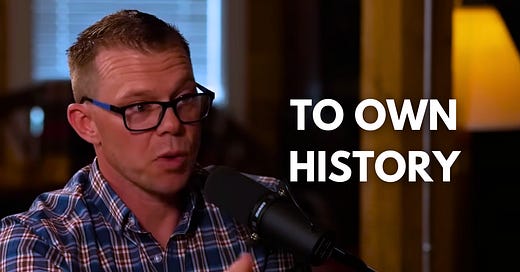To Own History: The Right, Revisionism, and Authoritarian Control
We're not taught how power protects and amplifies itself. Unfortunately, we're getting a lesson in real-time.
Dispatches From A Collapsing State is an independent media venture and it requires your support. If you haven’t already, subscribe to keep this project rolling. It also ensures you’ll gain access to exclusive articles like this one, as well as subscriber Q&A’s. I’ll be putting one of these together here in the very near future, so please leave your questions and topics in this article or email me.
I never thought this would be my life. Back in 2015, I was a professor who, in his free time, would occasionally get in his car, attend a political rally or report from the scene of a historical moment, and then share a few scattered thoughts. I still don’t fully understand what I was doing. I had a career and more than my fair share of work. I was running myself ragged. But I felt the need to be there. An urge. And then everything changed.
In the summer of 2016 I attended a Trump rally in North Carolina and my life was turned upside down. What I had felt in the air, a mixture of festering grievance and white supremacist energies, swept in like a weather front that had been teasing my bones. Suddenly, I was trying to warn people that MAGA, which was already infecting my family and hometown, was something other than a thing to laugh at on the news. It was taking hold. And growing.
What I knew, very quickly, was that if I was going to properly understand what was happening, what was growing, I would have to change myself and the way I saw the world. I had always been a student of history, but that history I knew suddenly didn’t hold up. I had to look at it all, go back to the source, and reflect on what no longer made sense.
My first foray into this project was American Rule: How A Nation Conquered the World but Failed Its People, a reconsideration of the United States of America. It was a big undertaking, relearning everything I thought I knew about my homeland. Before I started, I felt a great sense of intimidation. Who was I to do this? And what was the point of standing in the face of a great wave of conventional understanding. A few days into the research everything changed again. I realized what I thought I knew about the founding of the country, the intentions behind the framing, even the purpose of the Revolution itself, was completely different than what I had been taught or what I assumed. By the time I was done, I had an accurate vision of how we had arrived at Donald Trump and the current crisis.
But I had to go further. The Midnight Kingdom: A History of Power, Paranoia, and the Coming Crisis needed to be a deeper dive to understand white supremacy, capitalism, and the trajectory of power. I had to learn the history of “Western Civilization” and exactly what the authoritarians were trying to do. And, once again, intimidation gave way to understanding and a completely different worldview.
What I learned, besides the in’s and out’s of this whole insidious situation, was that stories guided everything. Mythologies, conventional histories, narratives. They shaped how people saw the world, or rather, how people didn’t see certain things. The American mythology was a vehicle to historic power and influence. The mythology of Western Civilization, as it is told, is the story of how a small group of white and wealthy elites have controlled the world and led us to this point.
And, as I crafted these books, my understanding of history, or I suppose the telling of history, shifted dynamically.
So, needless to say, I was both disturbed and fascinated when I had the chance to watch propagandist and authoritarian Tucker Carlson interview Darryl Cooper. Cooper is an alternative historian, something like a distant cousin to people like me. He dives into history, compares what he finds to the conventional narratives, and makes his decisions as to how he tells the narrative. And, like a lot of relatives, what he ended up doing is repellant.
What has deservedly gotten the most attention is Cooper’s take on World War II and his framing of that historic conflict. In summary, Cooper tells a story of how WWII was at least somewhat preventable had Winston Churchill simply let the Nazis take Poland. Churchill, however, was disgraced and possibly broke, so, emboldened by his own ego and put in place by wealthy financiers who wanted the war, he played his role. The Nazis, and this is where it gets especially insane, needed to carry out their conquests, but weren’t great at planning. And, so, faced with resource problems, just kind of had to carry out the Holocaust.
Weird how that happens.




